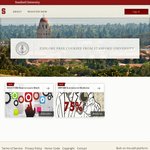HRP258: Statistics in Medicine
This course aims to provide a firm grounding in the foundations of probability and statistics. Specific topics include:
- Describing data (types of data, data visualization, descriptive statistics)
- Statistical inference (probability, probability distributions, sampling theory, hypothesis testing, confidence intervals, pitfalls of p-values)
- Specific statistical tests (ttest, ANOVA, linear correlation, non-parametric tests, relative risks, Chi-square test, exact tests, linear regression, logistic regression, survival analysis; how to choose the right statistical test)
The course focuses on real examples from the medical literature and popular press. Each week starts with "teasers," such as: Should I be worried about lead in lipstick? Should I play the lottery when the jackpot reaches half-a-billion dollars? Does eating red meat increase my risk of being in a traffic accident? We will work our way back from the news coverage to the original study and then to the underlying data. In the process, students will learn how to read, interpret, and critically evaluate the statistics in medical studies.
The course also prepares students to be able to analyze their own data, guiding them on how to choose the correct statistical test and how to avoid common statistical pitfalls. Optional modules cover advanced math topics and basic data analysis in R.
COURSE SYLLABUS
Week 1 - Descriptive statistics and looking at data
Week 2 - Review of study designs; measures of disease risk and association
Week 3 - Probability, Bayes' Rule, Diagnostic Testing
Week 4 - Probability distributions
Week 5 - Statistical inference (confidence intervals and hypothesis testing)
Week 6 - P-value pitfalls; types I and type II error; statistical power; overview of statistical tests
Week 7 - Tests for comparing groups (unadjusted); introduction to survival analysis
Week 8 - Regression analysis; linear correlation and regression
Week 9 - Logistic regression and Cox regression
PREREQUISITES
There are no prerequisites for this course.
EDUC115N: How to Learn Math
In July 2013 a new course will be available on Stanford’s free on-line platform. The course is a short intervention designed to change students’ relationships with math. I have taught this intervention successfully in the past (in classrooms); it caused students to re-engage successfully with math, taking a new approach to the subject and their learning.
In the 2013-2014 school year the course will be offered to learners of math but in July of 2013 I will release a version of the course designed for teachers and other helpers of math learners, such as parents. In the teacher/parent version I will share the ideas I will present to students and hold a conversation with teachers and parents about the ideas. There will also be sessions giving teachers/parents particular strategies for achieving changes in students and opportunities for participants to work together on ideas through the forum pages. The ideas I will share will be really helpful as teachers prepare to implement the new Common Core State Standards.
CONCEPTS
- Knocking down the myths about math.
Math is not about speed, memorization or learning lots of rules. There is no such thing as “math people” and non-math people. Girls are equally capable of the highest achievement. This session will include interviews with students. - Math and Mindset.
Participants will be encouraged to develop a growth mindset, they will see evidence of how mindset changes students’ learning trajectories, and learn how it can be developed. - Teaching Math for a Growth Mindset.
This session will give strategies to teachers and parents for helping students develop a growth mindset and will include an interview with Carol Dweck. - Mistakes, Challenges & Persistence.
What is math persistence? Why are mistakes so important? How is math linked to creativity? This session will focus on the importance of mistakes, struggles and persistence. - Conceptual Learning. Part I. Number Sense.
Math is a conceptual subject– we will see evidence of the importance of conceptual thinking and participants will be given number problems that can be solved in many ways and represented visually. - Conceptual Learning. Part II. Connections, Representations, Questions.
In this session we will look at and solve math problems at many different grade levels and see the difference in approaching them procedurally and conceptually. Interviews with successful users of math in different, interesting jobs (film maker, inventor of self-driving cars etc) will show the importance of conceptual math. - Appreciating Algebra.
Participants will be asked to engage in problems illustrating the beautiful simplicity of a subject with which they may have had terrible experiences. - Going From This Course to a New Mathematical Future.
This session will review where you are, what you can do and the strategies you can use to be really successful.
PREREQUISITES
There are no prerequisites for this course.


I slept through stats the first time… maybe a 2nd go might work